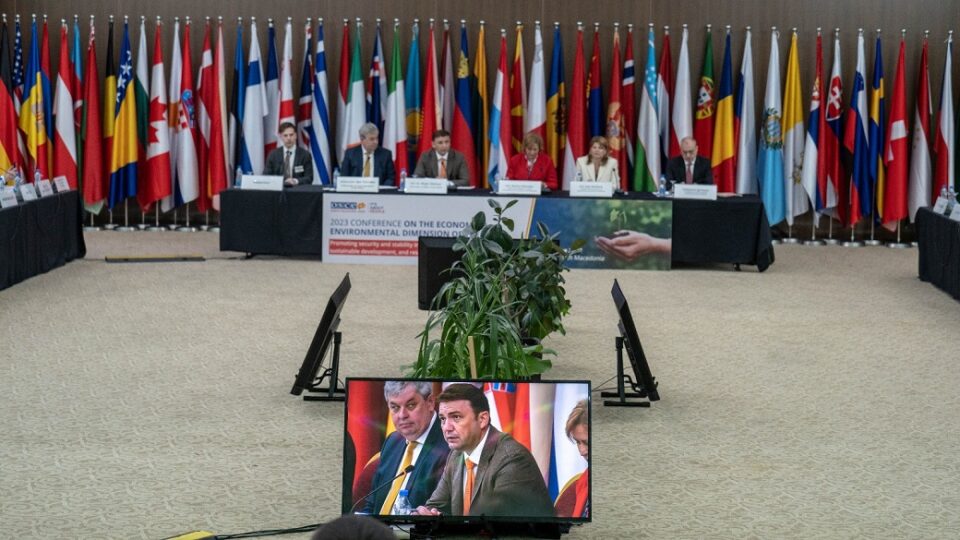Promoting security and stability in the OSCE area through sustainable development and resilient and inclusive economic growth was the focus of the 2023 Conference on the Economic and Environmental Dimension of the OSCE held in Struga on Wednesday.
OSCE Chairman-in-Office and Foreign Minister Bujar Osmani, Deputy Prime Minister for Good Governance Slavica Grkovska, Minister of Environment and Physical Planning Kaja Shukova and Deputy Minister of Energy of Ukraine Yaroslav Demchenkov addressed the opening of the conference.
The consequences of climate change, Minister Osmani pointed out, are becoming more visible and dramatic all over the world. According to him, we must ensure the resilience of the energy infrastructure and a sustainable and reliable energy transition, while fight against corruption and good governance provide prerequisites for stable economic and social development.
“Macedonia constantly provides additional incentive for economic recovery and overcoming economic and environmental challenges in the OSCE region. The fight against corruption, as part of the problem in the second dimension, remains the top priority of our Chairmanship,” said Osmani.
He noted that economies have started to recover, but working together regionally and internationally is necessary in order to deal with the consequences.
“Our economies are just beginning to recover. We must work together by sharing information and encouraging regional and inter-regional cooperation in order to make a real impact on the ground. It is imperative for all participating states to address the far-reaching consequences of the current situation by establishing measures and economic plans that promote sustainable development. We must stand together in enabling sustainable and inclusive economic growth,” Osmani pointed out.
Deputy PM for good governance policies Grkovska expressed satisfaction that the fight against corruption and the promotion of good governance are part of the agenda of Macedonia’s OSCE Chairmanship, at a time when we are faced with major regional and global challenges.
“Corruption erodes trust, it takes away resources intended for the common good, and perpetuates inequality. It inhibits economic growth and undermines the rule of law and innovation. With this in mind, a comprehensive approach is the only approach that can bring positive results, and it must include preventive measures and a strong legal framework that is effectively enforced. Cooperation between governments, civil society organizations and international institutions is essential to share best practices, foster mutual support and build a global alliance against corruption,” Grkovska pointed out.
Commenting on transparency and accountability, as the core of good governance, the Deputy PM stressed that officials should always act in the interest of the people, but in order to ensure that this principle is truly respected, the strengthening of supervisory institutions and independent audits must continue, as well as to have open channels through which citizens will speak openly and without fear about these issues.
She also mentioned the need to prioritize the issue of corruption in the domain of the environment, as it threatens ecosystems and prevents equal and inclusive development, concluding that strengthening good governance faces us with huge challenges, but also opportunities.
“We must remain committed and strengthen the weakest links in our communities that are porous to corrupt activities, and do all we can to build societies based on trust. We must accept shared responsibility and work tirelessly to create a brighter and more prosperous future for all. Those are battles worth fighting,” said Grkovska.
According to Minister of Environment and Physical Planning Kaja Shukova, now is the right time for governments to change their approach and put their countries on sustainable trajectories that prioritize economic opportunity, poverty reduction and planetary health and enable long-term economic, social and environmental prosperity.
“The OSCE has a role in raising awareness of potential risks related to climate security, in building capacities, assessing and addressing these risks in a participatory manner and involving all relevant stakeholders. This is not only for the sake of a comprehensive approach to security, but also because there is a broad regional framework necessary to play an appropriate role in such a regional approach,” Shukova said.
Around 150 participants have used the event in Struga as an opportunity to continue the longstanding dialogue on economic and environmental issues linked to security that has traditionally taken place within the framework of the Economic and Environmental Forum cycle.





Comments are closed for this post.